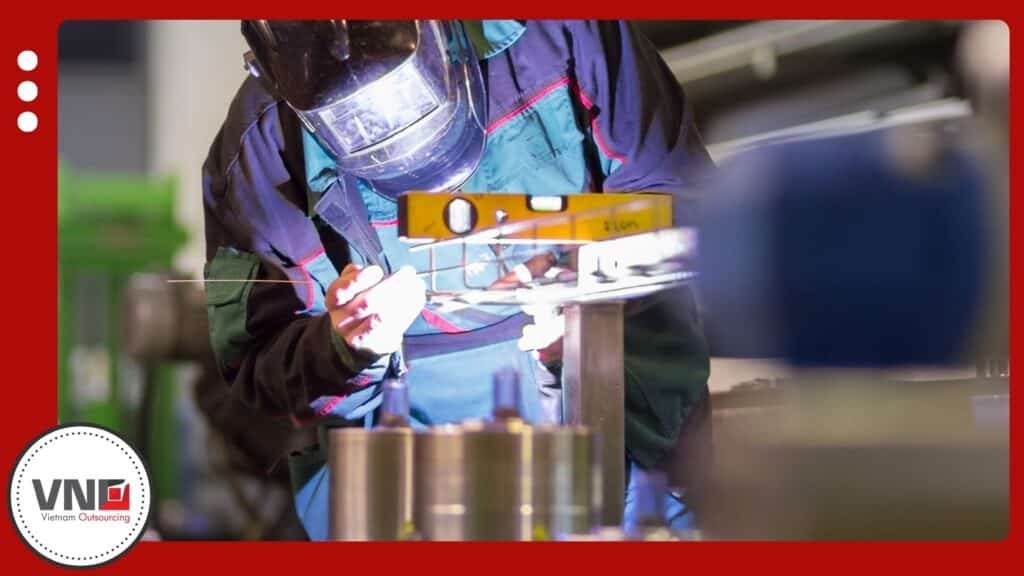Metal Fabrication Materials: The Best Choices for 2025 Projects

Table of Contents
Introduction
Choosing the right metal fabrication materials is crucial for achieving high-quality and cost-effective results in manufacturing and construction. Industries in the U.S., Canada, UK, and EU continue to seek reliable outsourcing partners, and Vietnam has emerged as a top supplier. In 2025, ongoing advancements in metal fabrication materials and techniques will shape the industry. Therefore, businesses must understand the best metals for fabrication, their benefits, and why Vietnam is the ideal sourcing destination.
Key Metal Fabrication Materials for 2025
Stainless steel for metal fabrication
Stainless steel remains one of the most widely used materials due to its strength, corrosion resistance, and durability. Automotive, aerospace, construction, and medical industries depend on it for various applications.
Advantages
- Resists corrosion, making it ideal for outdoor and marine use.
- Provides high strength and durability for structural applications.
- Requires minimal maintenance and has a long lifespan.
- Available in multiple grades, such as 304, 316, and 430, for different needs.
Aluminum in metal fabrication
Aluminum is a lightweight yet strong material widely used in transportation, aerospace, and architectural projects. Its recyclability and malleability make it a sustainable option.
Advantages
- Reduces overall structural weight while maintaining durability.
- Resists corrosion, making it suitable for humid environments.
- Easily machined and welded for custom fabrication.
- Offers excellent thermal and electrical conductivity, improving energy efficiency.
Carbon steel for cost-effective fabrication
Carbon steel is a budget-friendly choice for heavy machinery, construction, and industrial applications. It provides high tensile strength and is commonly used in structural beams, pipelines, and automotive parts.
Advantages
- Costs less than many other metals while maintaining strength.
- Offers durability for demanding applications.
- Welds and fabricates easily into different shapes.
- Available in low, medium, and high carbon grades to meet specific needs.
Brass for precision metal fabrication
Brass, an alloy of copper and zinc, is widely used in electrical, plumbing, and decorative applications. It is highly machinable and offers an attractive finish.
Advantages
- Resists corrosion, making it perfect for plumbing fittings.
- Provides a gold-like appearance, often used in decorative metalwork.
- Offers excellent conductivity for electrical applications.
- Non-sparking properties make it suitable for hazardous environments.
Copper in industrial fabrication
Copper is commonly used in electrical and thermal applications, including wiring, heat exchangers, and roofing materials. Its high conductivity and corrosion resistance make it a valuable material in metal fabrication.
Advantages
- Provides superior electrical and thermal conductivity, ensuring efficiency.
- Naturally resists corrosion, ensuring long-term durability.
- Recyclable, making it an environmentally friendly option.
- Antimicrobial properties make it ideal for medical applications.
Titanium for high-performance applications
Titanium is a high-performance material used in aerospace, medical implants, and high-end automotive components. It is known for its strength-to-weight ratio and exceptional corrosion resistance.
Advantages
- Offers extreme strength while remaining lightweight.
- Resists corrosion and withstands extreme temperatures.
- Biocompatible, making it ideal for medical implants.
- Lasts longer, reducing maintenance and replacement costs.
Why source metal fabrication materials from Vietnam
Cost-effective manufacturing
Vietnam offers lower labor costs, typically 40-50% lower than those in China. Additionally, competitive material pricing makes Vietnam an affordable option for sourcing metal fabrication materials. As a result, businesses can reduce expenses while maintaining high quality.
High-quality metal supply
Manufacturers in Vietnam follow strict international quality standards, including ISO 9001, ASTM, and CE certifications. These regulations ensure that materials meet U.S. and EU requirements, helping businesses comply with global industry standards.
Strong supply chain and global trade agreements
Vietnam benefits from multiple free trade agreements (FTAs) with the U.S., EU, and other global markets. These agreements reduce tariffs and import costs, making outsourcing more efficient and affordable. Consequently, companies can enhance their competitiveness by leveraging Vietnam’s trade advantages.
Reliable logistics and export infrastructure
Vietnam’s modern seaports, including those in Ho Chi Minh City, Hai Phong, and Da Nang, provide efficient shipping routes to North America and Europe. These ports reduce lead times and ensure timely deliveries. As a result, businesses can maintain a smooth supply chain and meet tight production schedules.
Conclusion
Choosing the right metal fabrication materials is essential for achieving both cost efficiency and high quality. In 2025, Vietnam continues to stand out as a top sourcing destination due to its competitive pricing, strong supply chain, and compliance with global standards. Businesses in the U.S., Canada, UK, and EU can gain significant advantages by outsourcing metal fabrication materials to Vietnam. By choosing Vietnam, companies ensure high-quality production while optimizing costs.

